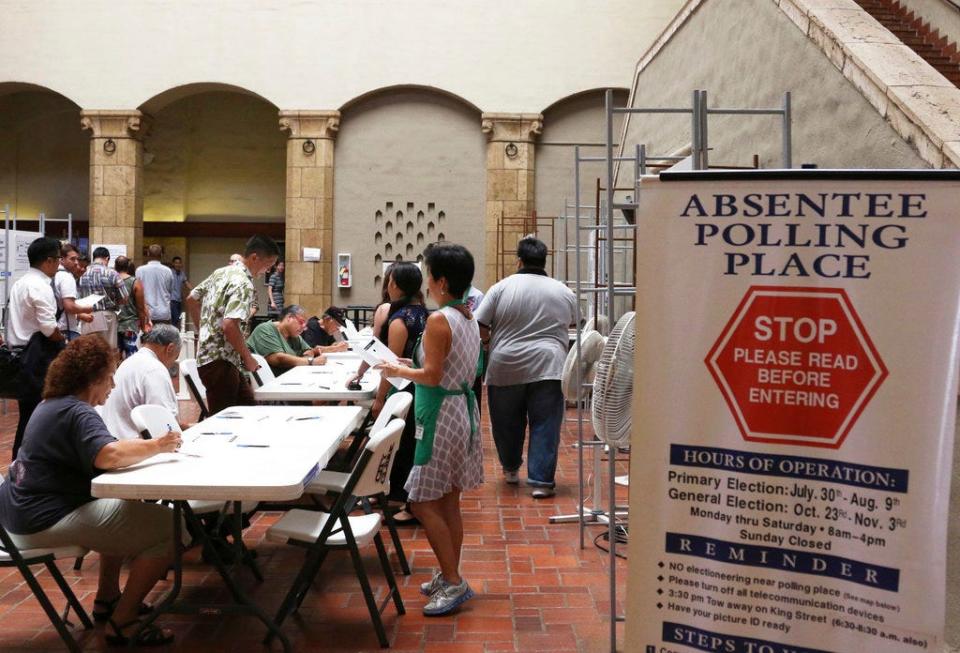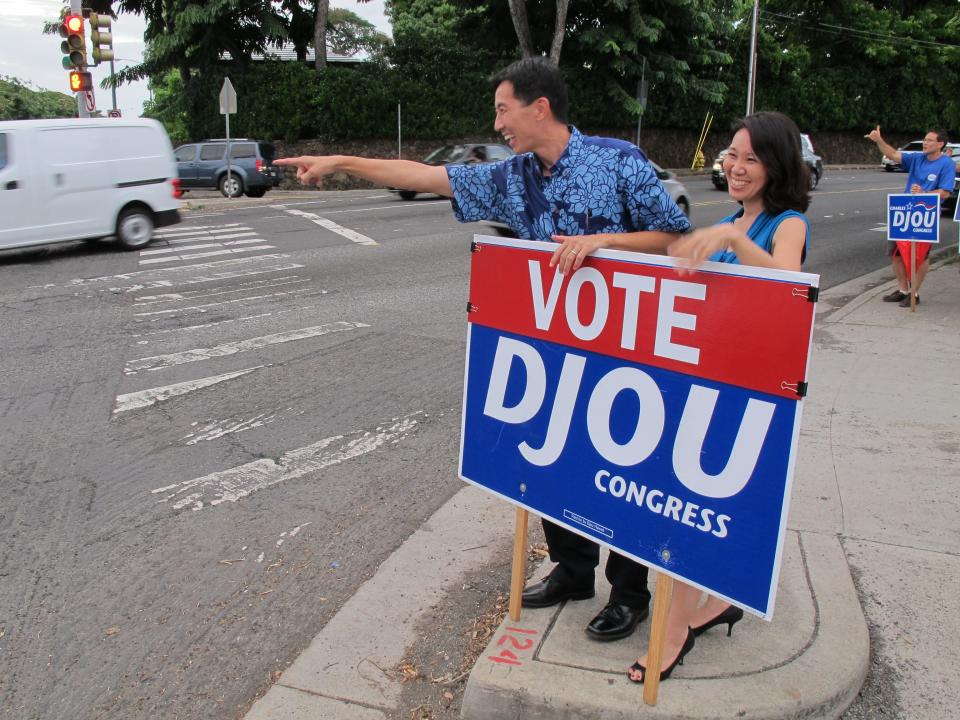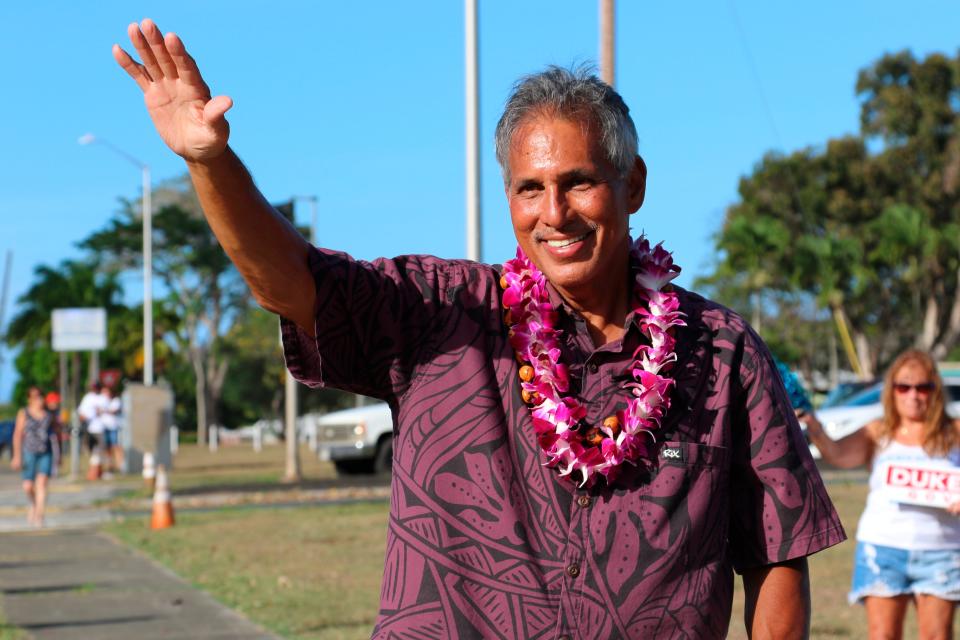Hawaii has a voter enthusiasm problem, could publicly funded campaigns help?
- Oops!Something went wrong.Please try again later.
Hawaii taxpayers could soon find themselves footing a $30 million bill to fund state political campaigns. Could this initiative breathe new life into local elections across the islands by ensuring more diverse candidates? Several lawmakers, activists and residents say the answer is a resounding yes.
The current campaign finance system in Hawaii is seen as favoring a small group of affluent donors, who often gain undue access to candidates and officials, according to the bill. Despite recent reforms like universal mail-in voting, voter turnout is among the nation’s lowest. During the last presidential election, Hawaii ranked 48 among all 50 states heading to the polls.
Common Cause Hawaii’s program manager, Camron Hurt, emphasized the need for more comprehensive changes to make Hawaii’s elections free from outside influence, more competitive and more popular.
“I think those (other reforms) are all tools to fix the same wheel. Right. So I think we fixed parts of the wheel, but the wheel still isn’t moving as efficiently as it can,” Hunt said.
More: Hawaii considers bill that could block Donald Trump from state's 2024 primary ballot

How would the publicly funded elections work?
Two powerful state Democrats, House Speaker Scott Saiki and Senator Karl Rhoads, introduced legislation to establish a system of publicly financed campaigns similar to Arizona, Connecticut, Maine, and New Mexico models.
Under this proposed system, candidates demonstrating sufficient voter support would be eligible to receive public funding for their campaigns. For instance, a candidate running for the Hawaii House of Representatives could secure up to $50,000 by gathering support from 200 contributors, each donating $5 to their campaign.
The funding amounts would vary depending on the position sought, with gubernatorial and lieutenant governor candidates potentially receiving up to $2.5 million. However, candidates seeking public funding must adhere to spending limits and be prohibited from raising private donations.
If these bills are passed, the system will be implemented for the 2028 elections. The program’s funding, $30 million from the state's coffers, would involve transferring money from the Hawaii Election Campaign Fund to the Campaign Spending Commission.

Hawaii has struggled with voter turnout for decades:
Hawaii hasn’t’ always struggled to get voters to the polls. After achieving statehood in 1959, voter participation in the general election soared to over 93%.
Why the voting numbers have plummeted over the decades remains fodder for political scientists and state officials. Based on registered voting lists, more than 100,000 people were considered “inactive voters” - moved, died, or went to prison - but by federal law, they can’t be purged for several inactive cycles, according to the state Office of Elections.
The 2020 presidential election between incumbent President Donald Trump and Democratic contender Joe Biden saw a decent voter turnout of 69.6%, but in 2022, a non-presidential year, just 48.4% of voters cast ballots in the state’s general election, an all-time low.
Colin Moore, a professor at the University of Hawaii Economic Research Organization, argues that publicly funded elections would encourage electoral competition, more direct engagement with voters and boost voter turnout.
“You have a system like this, (politicians will) spend more time engaging with the community and less time engaging with donors,” Moore told USA Today. “The other hope is that you’re engaging a different group of donors. I mean, the people who can provide $5 are very different from the people who can provide $1,000. And so there’s a hope that this will boost turnout as well.”
More: Hawaii looks to combat AI-generated deepfakes and disinformation ahead of 2024 elections
Moore says the key to the reform is ensuring that candidates who use public funds can receive enough money to compete with private funds. Since 1994, the average election spending for incumbents in the Hawaii House has been $57,883, whereas challengers, in inflation-adjusted dollars, have spent only $16,500 on average.
“I mean, politicians are rational actors. If they think that it’s’ not going to be enough money to win, then they’re going to opt out, and they’re going to raise private money. If it is enough money, then this is, in many cases, easier for them,” Moore said. “But $50,000 is enough money (for a local race)

Residents testify in support of the bill:
Over 500 pages of testimony have already been submitted by residents, activists, and lawmakers. Most supporters believe the legislation bolsters democracy by improving voter access and providing greater transparency regarding candidate donations.
“(This measure) is squarely aimed at defending democracy. We all recognize the threats it faces,” said Dawn Morais Webster, a local advocate and resident. “We’re all aware of the harm caused by Citizens United. However, local government possesses the capability to fight back, and this clean elections bill does just that.”
Joshua DK Lum, a Maui resident, argued that the bill would create a more level playing field for those affected by last year’s Lahaina wildfires that killed 100 people and caused thousands to be displaced from their homes.
“As a concerned citizen deeply affected by the recent wildfires on Maui, I believe this bill is crucial for fostering a more equitable political landscape,” Lum said. “We have seen the negative impacts of pay-to-play politics and the need for accountability, especially in light of the environmental mismanagement contributing to the devastating fires.”
More: When will the House's remaining 3 open seats be filled? What to know
Hawaii State Rep. Jeanne Kapela (D), the first woman and Native Hawaiian to represent her district, envisions the bill injecting excitement into elections by amplifying the influence of women, Native Hawaiians, and working-class individuals.
“This is about ensuring that a wide array of people, who often find their voices unheard in the Legislature, will finally be heard,” Kapela said. “When legislators cater to corporate and donor interests, they neglect the public’s interest.”
Is anyone opposed to the bill?
Earlier this month, Honolulu Civil Beat revealed that Hawaii House Majority Leader Nadine Nakamura opposes the bill, citing concerns about providing an unfair advantage to Republican candidates through taxpayer-funded support.
“Unless you’re a strong candidate, you won’t be able to utilize it. You won’t have the means to gather the $5 contributions from voters.” Rhoads said, “Donald Trump, the most popular Republican in the state, only garnered 30% of the vote (in 2020). This indicates that the pool of Democratic candidates eligible for the $5 contributions is significantly larger.”
Nakamura did not respond to USA Today’s’ request to comment.
Jeremy Yurow is a politics reporting fellow based in Hawaii for the USA TODAY Network. You can reach him at JYurow@gannett.com or on X @JeremyYurow
This article originally appeared on Arizona Republic: Hawaii legislators propose publicly funded campaigns to fix election woes

